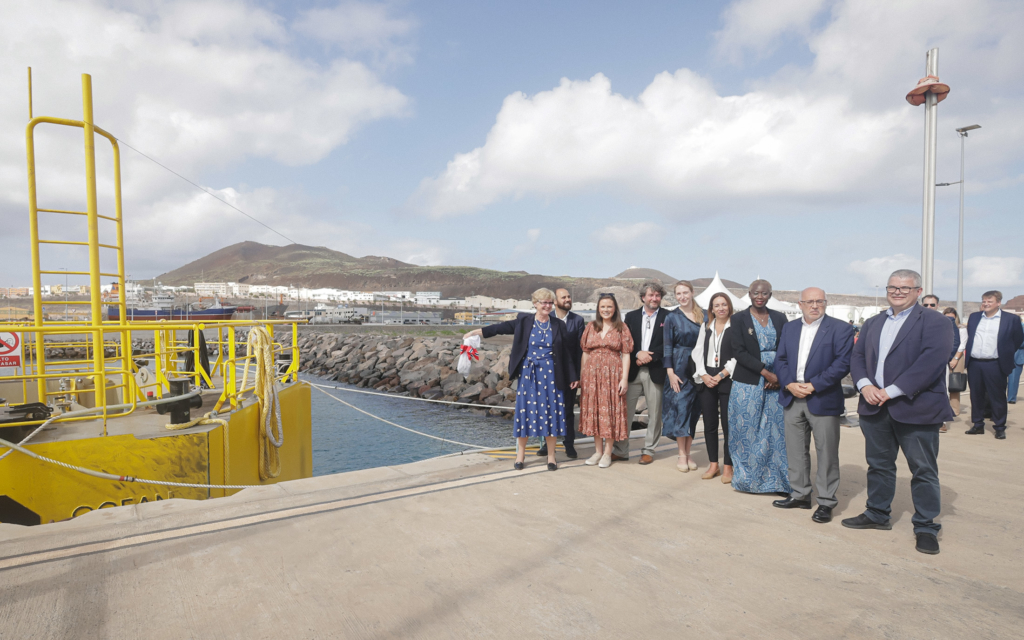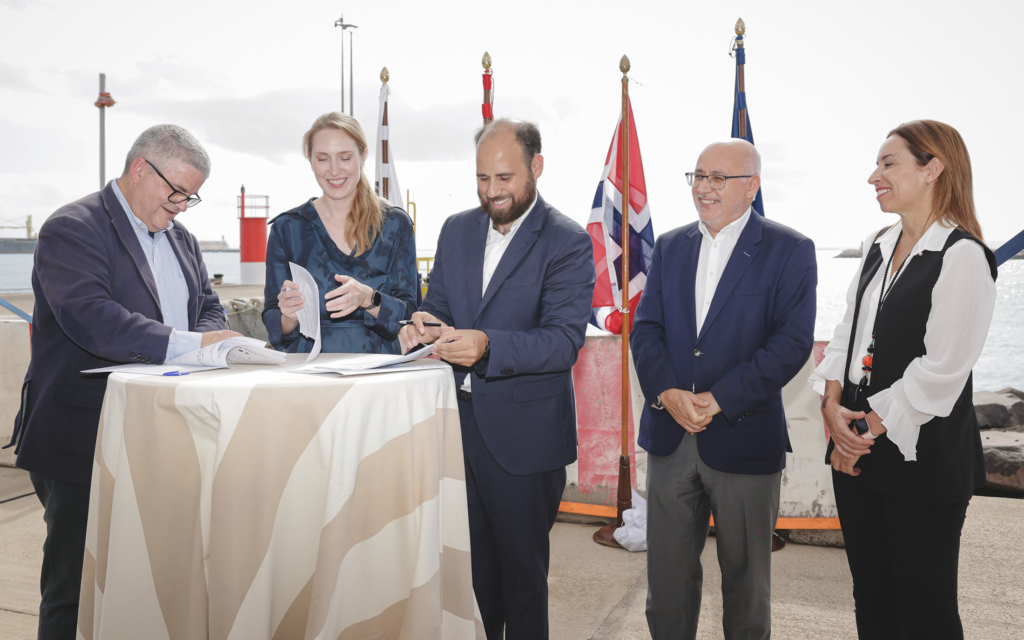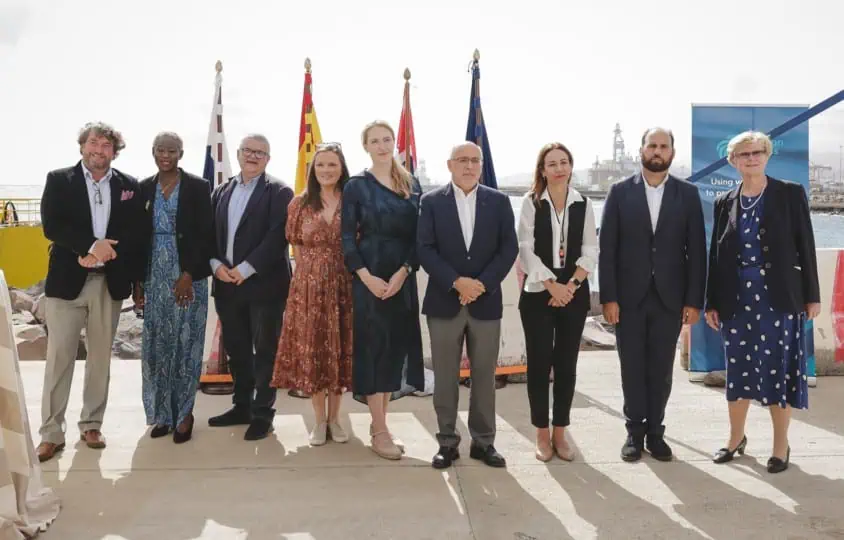The Norwegian company Ocean Oasis unveiled the prototype of its offshore floating desalination plant at Las Palmas in Gran Canaria. The prototype, named “Gaia”, is powered by wave energy and will be tested at the Oceanic Platform of the Canary Islands (PLOCAN). This technology will allow the production of fresh water from ocean waters by harnessing the energy of the waves to carry out a desalination process and pump potable water to coastal users.
The launch ceremony for the Gaia prototype took place at the Juan Sebastián Elcano dock in the port of Las Palmas. It was attended by the General Director of Energy of the Government of the Canary Islands, Rosana Melián, the President of the Cabildo de Gran Canaria, Antonio Morales, the director of PLOCAN, José Joaquín Hernández Brito, as well as the Ocean Oasis team and the Norwegian company Grieg Edge on behalf of their investors.
Ocean Oasis CEO Kristine Bangstad Fredriksen welcomed everyone: “We are looking forward to continuing to develop our activities on the islands. We want this day to be a celebration of our collaboration and what is to come.”
The company’s COO, Sebastián Feimblatt, highlighted that the Canary Islands “provide us with the ideal environment to test our technology both due to PLOCAN’s infrastructure, experience and location, as well as the possibility of developing its solution in a market as relevant as the of the Canary Islands in matters of desalination and offshore activities”.

Prototype buoy
The CTO of Ocean Oasis, Thomas B. Johannessen, explained that the prototype, assembled in the port of Las Palmas, is 7 meters in diameter and 10 meters high and weighs about 100 tons. The device extracts the energy of the waves through the relative movement of two bodies and takes advantage of this energy directly to carry out a desalination process by reverse osmosis without the need to produce electrical energy, thus increasing the efficiency of the process. Gaia will be anchored in the southern area of the PLOCAN test site at Punta de la Mareta.
Local support
The General Director of Energy, Rosana Melián, highlighted the progress that the islands represent for becoming a testing platform for new technologies aimed at clean energy. It is becoming the center of attention for large companies that wish to delve into these technologies to advance the progress of the energy transition. She pointed out that all the “green” variants that can be incorporated into the energy range that the Canary Islands projects in the future “will make us take a significant leap in the ambitious decarbonization targets that the islands have set for the years 2030 and 2040”.
Gran Canaria depends on desalinated waater for its survival, and it is more important every day because of the drought. But desalination is a process that consumes a lot of energy. If we consider all the processes necessary to obtain water, this represents between 15 and 20% of the total energy consumption of our territory. In 2016, the Cabildo de Gran Canaria launched the “Renovagua” plan with the aim of reducing the use of conventional energy in the production and distribution of water by 40%. Therefore, we receive these types of innovative initiatives with great interest since they can be a very relevant contribution to guarantee the supply of water and accelerate the energy transition”.
The Cabildo de Gran Canaria president, Antonio Morales
The director of PLOCAN, José Joaquín Hernández Brito, congratulated Ocean Oasis for the desalination prototype that it will test in the PLOCAN test site, an experimentation area that he hopes will be used much more.

Funding
The CEO of Ocean Oasis, Kristine B. Fredriksen, expressed thanks for the financial support for the development of the prototype received from Innovation Norway, the Norwegian Research Council, the European Innovation Council Accelerator EIC and especially the Gran Canaria Economic Promotion Society and ICEX through its Invest in Spain program co-financed with FEDER funds, being present at the event.
Ocean Oasis’ main investor, Grieg Maritime Group, was represented at the event by Kjerstin Hernes, Chief Strategy Officer and Head of Ocean Ventures. She said: “There is still much to be done. But we have a strong trust in Kristine and the team. Together, they will deliver as promised – and I can’t wait to taste the first drops of freshwater conjured by waves end ingenuity.”
Future developments
Kristine B. Fredriksen informed that Ocean Oasis has established an R&D office and workshop in Las Palmas de Gran Canaria and announced that the company will continue developing activities in the Islands, starting with the Gaia prototype.
Once this stage has been completed, with the testing of the desalination plant at the PLOCAN test site, a second installation will be built. In this phase, the prototype will be scaled with the capacity to produce water for consumption. It will be connected to the water distribution system to help tackle water stress in a sustainable way. This phase is supported by the EU EIC Accelerator.
Desalination growth and offshore potential
Currently, more than 300 million people depend on desalination for their water supply, accounting for about 1% of the total freshwater supply. Climate change and the depletion of traditional resources are increasing the need for desalination, and it is estimated that this will have to double by 2030 to meet the needs of the population.
However, traditional desalination requires large amounts of energy, leading to a large carbon footprint and high cost. From this premise, Ocean Oasis points out that desalination that uses wave energy brings a new dimension and additional opportunities to supply desalinated water without emissions, at a competitive cost, and without the use of valuable land.
The use of offshore wave energy in deep waters also allows a clean capture of water and the discharge of brine in a sustainable way, minimizing the environmental impact.
Ocean Oasis markets
Ocean Oasis technology can be used on the coasts of the world where wave action is sufficient, including, among others, the Canary Islands, South Africa, Morocco, Chile and Australia.
The potential for application in the Canary Islands presents a great opportunity to supply the islands with desalinated water with reduced environmental impact and cost. In this sense, the company hopes to build and install its first commercial installations in the Canary Islands.











